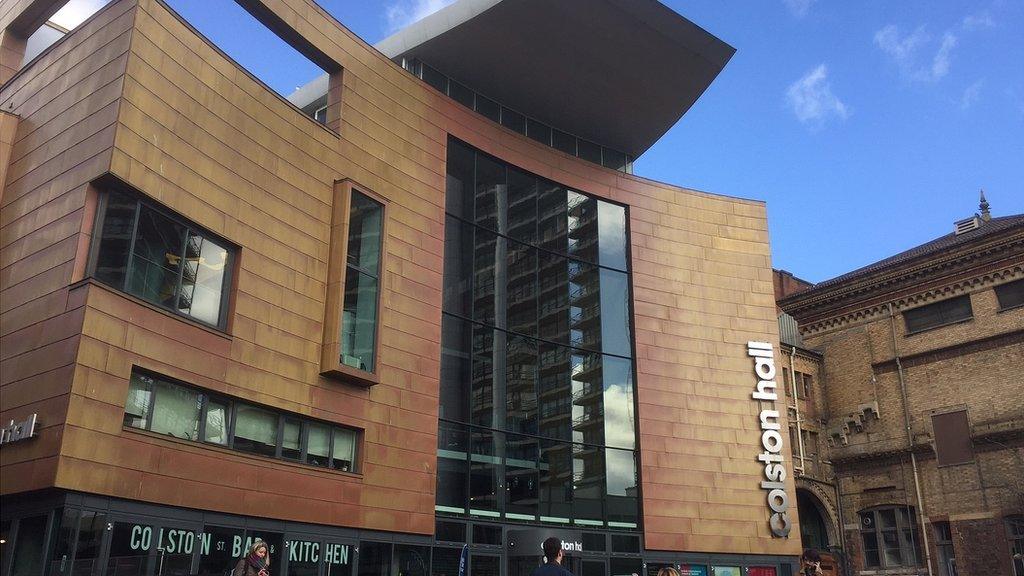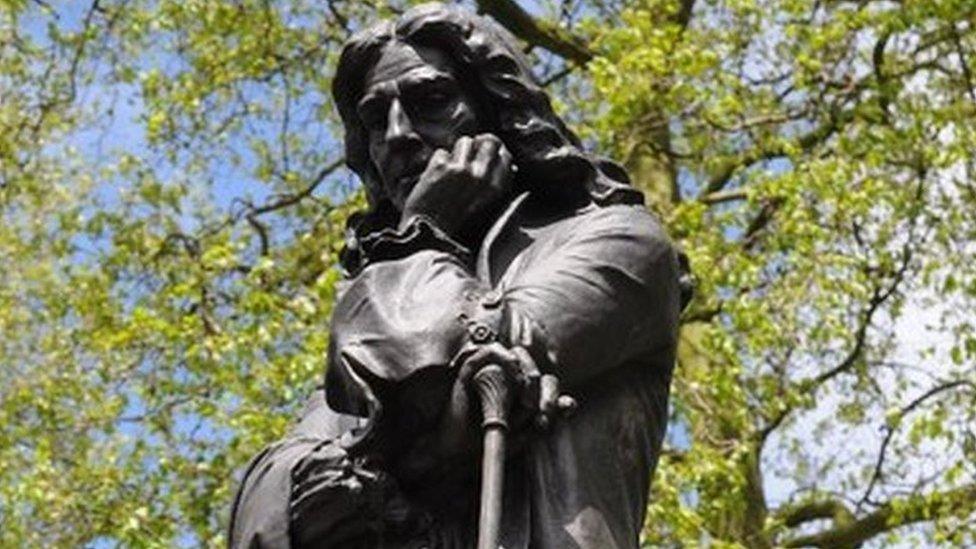Bristol's Colston Hall to drop 'toxic' slave trader name
- Published

Colston Hall is due to close for a £49m revamp at the end of the year and reopen in 2020
A music venue is to ditch the "toxic" name it shares with a 17th Century slave trader.
Colston Hall bosses had previously maintained that the Bristol attraction was named after the street it is on, rather than Edward Colston.
Much of the Bristol-born MP and merchant's wealth came from the slave trade.
The change, which will not come into effect until 2020, follows a campaign to urge Colston Hall to alter its name.
Ready for 'backlash'
Louise Mitchell, chief executive of the Bristol Music Trust charity that runs Colston Hall, said it was the "right thing to do" for artists, the public and the "diverse workforce" at the venue, which recently announced plans for a refurbishment costing nearly £50m.
She said: "The name Colston does not reflect the trust's values as a progressive, forward-thinking and open arts organisation.
"We want to look to the future and ensure the whole city is proud of its transformed concert hall and so when we open the new hall, it will be with a new name."
Louise Mitchell, chief executive of the Bristol Music Trust charity that runs the venue said it was the "right thing to do"
She acknowledged there would be a "backlash" over the change, but admitted the trust had "needed to resolve" the issue ahead of talks with potential sponsors.
"Effectively, I've been selling a toxic brand up to now," she said.
"We need to move forward on this. It's not actually about commerce, it's about doing the right thing."
More on this story, and other news from the West
Over the years, some of the world's biggest music stars have performed at Colston Hall, including The Beatles, David Bowie, Ella Fitzgerald, Louis Armstrong and Bob Dylan.
The legendary Bristol band Massive Attack have always refused to play at Colston Hall, and the city's mayor Marvin Rees has said he is "not a fan" of the name., external A petition launched in February calling for a change gathered more than 2,000 signatories.

Edward Colston (1636-1721)

A grand bronze statue of Edward Colston has stood in Bristol city centre since 1895
Colston was born into a prosperous Bristol merchant's family and, although he lived in London for many years, was always closely associated with the city
By 1672, he had his own business in the capital trading in slaves, cloth, wine and sugar. A significant proportion of Colston's wealth came directly or indirectly from the slave trade
In 1680, he became an official of the Royal African Company, which at the time held the monopoly in Britain on slave trading
He donated to churches and hospitals in Bristol, also founding two almshouses and a school
Colston also lent money to the Bristol corporation and was a city MP for a short time
The bronze statue commemorating Colston in the city of his birth has an inscription on it which reads: "Erected by citizens of Bristol as a memorial of one of the most virtuous and wise sons of their city". There is no mention of his role in the slave trade
Source: BBC History/Nigel Pocock

However, the majority of those who have taken to BBC Radio Bristol's Facebook page to express their opinions have not welcomed the move.
Chris Goldsworthy said it was "political correctness gone mad", while Nick Davies said it was a mistake as the "past should not be airbrushed out".
Kate Gillam said "changing the name won't change what happened. It's part of our heritage".
The music venue is not the only place in Bristol with links to Colston that has come under fire. Bristol Cathedral is reportedly considering removing a large stained-glass window, external dedicated to the merchant, following criticism from anti-racism campaigners.